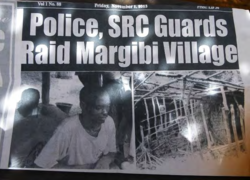
In a particularly serious incident in 2013, plantation security and police violently raided the village of Daokai within the Socfin 2 concession area
Sexual Violence & Threats Documented at Liberia Agricultural Company
MONROVIA – Swiss-based human rights group, Bread for all (Bfa) and her Liberian partners, Green Advocates International (GAI), Alliance for Rural Democracy (ARD) and Natural Resource Women Platform (NRWP) have released a report cataloging various forms of human rights violations at two concessions in Liberia.
Released simultaneously in Monrovia and Switzerland on Thursday, February 21, 2019, the report alleged that residents of Grand Bassa, Margibi and Bong Counties are being harmed by activities of Salala Rubber Corporation (SRC) and Liberia Agricultural Company (LAC).
SRC and LAC hold concessions of over 128,000 hectares in Central Liberia. The Luxembourgish Company Socfin owns SRC and LAC as well as several Swiss subsidiaries, including Sogescol and Socfinco.
All of the subsidiary companies, including the Liberian plantation companies, have the responsibility to prevent and address human rights abuses according to the United Nations Guiding Principles for Business and Human Rights.
Entitled ‘Struggle for Life and Land’ shows that the affected communities in the three counties have continued to suffer from the loss of their customary and deeded lands due to forceful eviction and destruction of their towns and villages, pollution of water sources, desecration of shrines and sacred places, harassment, intimidation, arrest and detention of human rights defenders.
Simpson Snoh, ARD Program Liaison told a news conference Thursday to launch the report in Monrovia that the report further shows that people in many of the communities covered by the report were not sufficiently consulted about the plantation expansions, did not give their consent and were forcefully evicted from their customary lands.
He named some of the communities adversely impacted by SRC and LAC operations as: for SRC: Ansa; Deedee; Daokai; FahnWhalee; Garjay; Gorbor; Jorkporlorsue; Kuwah; Lanco; SiafaMolley and Tartee; For LAC: Floejoe; Gboecleon; Moncray; Zoewee; Ceezon; Wonwru; Gbarfein; Issac Gaye; Nahn; Saw Mill; Trodi and Come Back Hill.
He noted that the report also captured threats to food security, which has deteriorated and access to water has become difficult for many residents of villages around the plantations.
“This situation violates the rights of local communities as enshrined in applicable Liberian laws and international instruments to which Liberia is a party as well as standards that the companies are obligated to adhere to,” Snoh said.
Flanked by representatives of Green Advocates International and Natural Resource Women Platform (NRWP), Mr. Snoh said where compensation payments were made for loss of crops and houses, they were in most cases insufficient to compensate for the losses incurred.
“Additionally, families in affected communities face increasing difficulties in sending their children to school because of the loss of farmland coupled with meager employment opportunities provided by the plantations,” he added.
According to him findings of the report also include violence and threats, particularly against women and human rights defenders.
Women, he noted have repeatedly reported being subjected to sexual violence by subcontractors and, in some cases, by plantation security guards.
According to him, the statements made by numerous people living on or next to the plantations tell about a climate of fear.
“In a particularly serious incident in 2013, plantation security and police violently raided the village of Daokai within the Socfin 2 concession area,” he quoted portion of the report.
He disclosed that the plantation security and police ransacked houses, stole electronic equipment and beat up a villager.
According to the report SRC, LAC and their owner company Socfin violated fundamental human rights and due diligence standards which they are required to adhere to under applicable Liberian laws and international instruments including, for example, the Constitution of Liberia, International Covenant on Economic, Social and Cultural Rights (ICESCR), UN Guiding Principles on Business and Human Rights (UNGP), Voluntary Guidelines on the Governance of Tenure … of the FAO (VGGT), and the IFC Performance Standards (PS) as well as the OECD Guidelines.
“As a matter of remedy, the report calls on the Government of Liberia to take appropriate measures to ensure protection for the rights of communities affected by these plantations in keeping with Liberian laws and international standards to which the government is a party,” he noted.
He explained that the authors of the report are calling on the government to ensure that provisions of the new Land Rights Act relating to the review and/or extension of concessions after their expiration are applied to the SRC and LAC plantations.
“The companies involved are also being called upon to adhere to the national and international standards to which they are obligated and ensure that the violations attributed to their operations are properly looked into and appropriate remedies are provided the affected communities.













